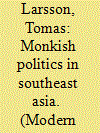| Srl | Item |
| 1 |
ID:
139665


|
|
|
|
|
| Summary/Abstract |
In the Theravāda Buddhist polities on the mainland of Southeast Asia, abiding concerns about the proper structuring of the relationship between the ‘two wheels of dhamma’ (i.e. the realm of religion and the realm of politics) have had a profound influence on processes of state formation and political legitimation. This article explores one such religious ‘effect’ on the constitutions and electoral laws of modern Burma/Myanmar, Siam/Thailand, Cambodia, and Laos, namely the official disenfranchisement of Buddhist monks (and, in some instances, Buddhist ‘nuns’ as well as non-Buddhist clergy). The article traces the historical evolution of this Buddhist exception to the democratic principle of equal and universal suffrage, and assesses the extent to which dominant theoretical approaches in the social sciences help us to understand the politics of religious disenfranchisement in Southeast Asia. It finds that neither secularization theory nor the religious-economy approach can explain observed patterns. Instead, the article offers an account of the politics of religious disenfranchisement that emphasizes the role of ideas and historical context.
|
|
|
|
|
|
|
|
|
|
|
|
|
|
|
|
| 2 |
ID:
155454


|
|
|
|
|
| Summary/Abstract |
How does nation branding reflect state–society relations and more pertinently, what does it reveal about the way political power is legitimated by a given state and why? This question seldom receives attention in the rapidly expanding scholarship on nation branding. This article examines and interprets national branding processes in post-apartheid South Africa within the context of larger efforts by political elites to legitimate the new state and society and to address some of the complex legacies of the apartheid past. These efforts targeted domestic and international audiences in distinctive ways, intertwined foreign and nation-building policies, and sought to communicate key ideas about South Africa as state and nation and about the state’s role in the wider world order. The article considers how different groups of state-linked actors participated in exercises of legitimation and the discursive mechanisms that were relied on. Three such mechanisms are highlighted: (i) the construction of a distinct African-style modernity (here termed Afro-modernity); (ii) claims of South African exceptionalism articulated in boosterist branding campaigns; and (iii) expressed, variously through foreign policy signals, diplomatic posturing and hallmark events, the projection of a national role conception as leader on the African continent and of the Global South. These compound political processes had ambivalent and incomplete outcomes, however. This article considers why and what the implications are for the South African state and its society.
|
|
|
|
|
|
|
|
|
|
|
|
|
|
|
|